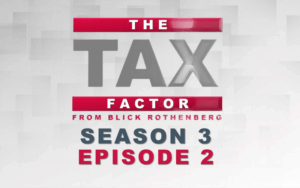
HMRC’s Monthly Tax Take Rises Sharply – But At What Cost?
Over 2.5 Million More Taxpayers Have Entered the Higher Income Tax Band Since the 2021/22 Tax Year
23 July 2025 | Author: Tom Goddard
The Government’s ongoing policy of fiscal drag is leading to a sharp increase in tax receipts
Tom Goddard, Senior Associate, said:
HMRC’s latest tax receipt statistics prove optimistic for the Chancellor, Rachel Reeves. Receipts across almost all major tax streams are trending upwards, with the growing impact of fiscal drag causing a major rise in the income tax take.
Fiscal drag occurs when tax thresholds remain frozen while earnings rise – resulting in more individuals being pulled into higher tax brackets. This often goes unnoticed by many taxpayers, earning it the label of “stealth taxation”.
Over 2.5 Million More Taxpayers Have Entered the Higher Income Tax Band Since the 2021/22 Tax Year
The impact of fiscal drag has become increasingly evident over the past three years. Fiscal drag is a form of stealth taxation where tax thresholds are frozen as wages rise, meaning more individuals are pushed into higher income tax brackets. Since the 2021/22 tax year, over 2.5 million more workers have entered the higher income tax band, and the number of additional rate taxpayers has almost doubled in the same period. HMRC’s statistics show that income tax receipts are up 9.15% over the past 12 months compared to the previous year.
Inheritance Tax Also Feels the Effect of Threshold Freezes
It is not just income tax thresholds that have been frozen. The Nil-rate band for inheritance tax (IHT), the threshold above which IHT becomes payable, has remained unchanged since 6 April 2009. As a result, a tax which many previously only viewed as being for the wealthy, is now a growing concern for many more people, who must now consider the prospect of IHT liabilities and take steps to plan accordingly. The IHT take has risen by 10.5% over the past 12 months compared to the previous year according to HMRC.
This prolonged freeze on thresholds has seen more estates falling within the IHT net, increasing the number of families affected and prompting a greater need for financial planning.
The Middle Class Carries the Burden
With Labour’s manifesto commitments not to raise income tax, national insurance, or Value Added Tax (VAT), and recent reports suggesting a new wealth tax is no longer on the table, the responsibility for addressing the government’s deficit, made worse by welfare policy reversals and spending pledges, looks increasingly likely to fall on the shoulders of the UK’s middle-income earners who will be the main victims of fiscal drag.
Inflation Offers a Silver Lining for Treasury
Despite the growing tax burden on individuals, economic indicators such as inflation may offer some fiscal breathing room for the Government.
Tom added:
The greatest cause for optimism in terms of tax revenue for the Government lies in the current Consumer Prices Index (CPI) inflation rate, which stands at 3.6% and has been steadily ticking upwards over recent months. Inflation measures the rate at which prices, or the value of money, change over time. A modest inflation rate is generally seen as a sign of a healthy economy and often translate to rising wages, and it is this translation that the Chancellor is counting on.
Would you like to know more?
If you would like to discuss any of the above, please speak to your usual Blick Rothenberg contact.
You may also be interested in

Closing the Fiscal Black Hole: Why Tackling the £46.8bn Tax Gap Should Be Rachel Reeves’ Priority

Record £2.4 Billion in Tax Relief Signals Government Backing for UK’s Creative Industries













